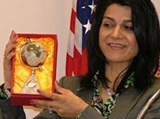
12.09.06 – Afghanistan native talks on past, present, future of embattled country.
WILLIAM KELLY
Palm Beach Daily News
Daily News Staff Writer
Saturday, December 09, 2006
Speaking this week at a luncheon hosted by the World Affairs Council of the Florida Palm Beaches at the Northern Trust Bank, Shamim Jawad recalled the Afghanistan of her youth as a moderate and peaceful nation, its capital Kabul as a fascinating blend of Eastern and Western cultures. 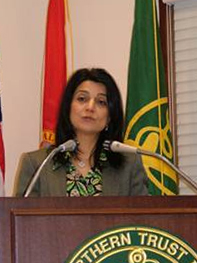
Women often were employed as teachers and had a voice in Afghan affairs, she said. Then came the Soviet invasion of 1979, which plunged the central Asian country into nearly three decades of warfare. Then a teen, Jawad moved with her parents to the United States in 1980. Today her husband, Said T. Jawad, is Afghanistan’s ambassador to the United States, and she is an advocate for the rights of women and children in her native land.
After destroying Afghanistan’s economy and infrastructure, the Soviets departed in 1989, defeated by the fierce tribal resistance.
That, in turn, led to a bloody civil war until the Taliban, a Sunni Islamist fundamentalist movement, emerged in 1996 to rule most of the country.
For women in particular, an even deeper darkness descended. They became prisoners in their homes, virtually disappearing from society to escape the judgment and wrath of the Taliban, Jawad said.
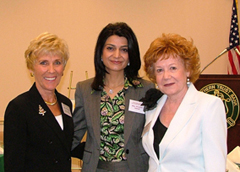 “Appearing in public was often an invitation for abuse and violence,” she said. “Women were deprived of their right to education, work and travel.”
“Appearing in public was often an invitation for abuse and violence,” she said. “Women were deprived of their right to education, work and travel.”
Burkhas were required dress, and women whose ankles were exposed were whipped in public. In some cases, those with painted nails had their fingers cut off.
They were banned from schools and universities. Taliban rules permitted the public stoning of women if they were even accused of extramarital sex.
And any woman accused of adultery or any other crime had no legal rights and could not petition a court, Jawad said.
“Women could not wear bright colors, sing or dance,” Jawad said. Even laughter was frowned upon.
Life was no less hellish for children.
“Under the resentful gaze of the Taliban, children were forced to beg for crumbs and could not fly a kite or even smile,” Jawad recalled.
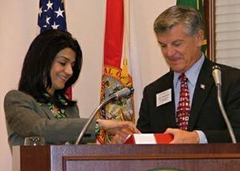 Clinics were destroyed. Disease spiraled out of control. Even today, Afghanistan’s infant mortality rate of 60 per 1,000 is one of the highest in the world, she said. The average life expectancy is 46 years. There are 2 million orphans. And, each month, 30 people are killed by land mines left behind by Soviet soldiers nearly 20 years ago.
Clinics were destroyed. Disease spiraled out of control. Even today, Afghanistan’s infant mortality rate of 60 per 1,000 is one of the highest in the world, she said. The average life expectancy is 46 years. There are 2 million orphans. And, each month, 30 people are killed by land mines left behind by Soviet soldiers nearly 20 years ago.
Jawad’s husband was an adviser to Afghan President Hamid Karzai for two years after the United States drove the Taliban from power in 2001. And she has returned to the country since her husband was appointed ambassador in 2003.
Jawad said much of what she has seen has filled her with hope.
“Now they are de-mining, replanting and rebuilding,” she said.
Vineyards, pomegranate and almond trees are sprouting where mines were buried. That is no small accomplishment considering that each mine removal costs $1,000, she said.
More than 500 health clinics have been built and now serve 5 million people. Nearly 10 million children have been vaccinated against polio.
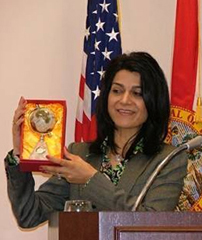 A gift from the World Affairs Council of the Florida Palm Beaches
A gift from the World Affairs Council of the Florida Palm Beaches
“The wounds of war are healing and smiles are reappearing on faces of women and children. Afghanistan today is a country reborn.”
Today, 68 women are members of the Afghan parliament. Women are being educated in the United States and elsewhere. One recently returned with a degree she earned at a university in Arizona, and now employs 500 Afghan women.
“None of them are wearing a burkha,” Jawad said.
Still, if the Taliban has its way, they’ll one day be wearing them again. Five years after the Taliban were thought to be defeated by the Americans, the organization has gathered strength in two provinces and is challenging NATO troops. The country’s national army still isn’t strong enough to fight them alone, she said.
The nation recently began to see its first suicide bombers — killers who have copied the insurgent tactics of the Iraq war in hopes of further destabilizing the fledgling democracy.
Jawad pins much of her hope on what she called the country’s “human capital.” She spoke of women and children who are just as determined to keep the light of liberty alive as the Taliban is to snuff it out. Jawad told a story of students who arrived for school one morning to find their classroom burned to the ground.
“Rather than going home, they insisted on staying and continuing their lessons beside the ashes,” she said.
